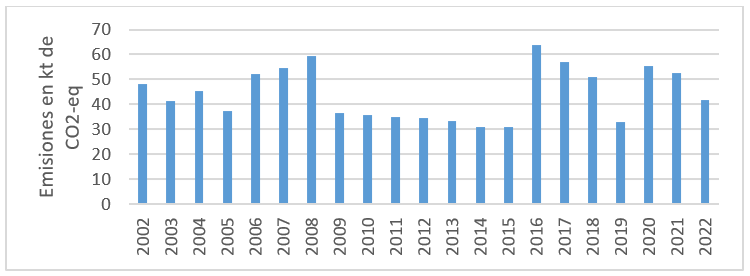Greenhouse gases derived from the biological tratament of solid waste
Main Article Content
Abstract
Biological treatment is a practice that reduces the volume of materials, promotes the stabilization of waste, and destroys pathogenic agents. The management through aerobic processes to encourage decomposition causes most of the degradable organic carbon in the waste to be converted into biogenic carbon dioxide. In the anaerobic conditions of compost bags, methane and nitrous oxide are also formed. This study estimated greenhouse gas emissions from composting in Cuba for the time series 2002-2022 by applying the 2006 Guidelines of the Intergovernmental Panel on Climate Change. It was found that methane and nitrous oxide emissions resulting from biological waste treatment are typically low in Cuba.
Downloads
Article Details

This work is licensed under a Creative Commons Attribution-NonCommercial 4.0 International License.
Those authors who have publications with this journal accept the following terms of the License Attribution-NonCommercial 4.0 International (CC BY-NC 4.0):
You are free to:
- Share — copy and redistribute the material in any medium or format
- Adapt — remix, transform, and build upon the material
The licensor cannot revoke these freedoms as long as you follow the license terms.
Under the following terms:
- Attribution — You must give appropriate credit, provide a link to the license, and indicate if changes were made. You may do so in any reasonable manner, but not in any way that suggests the licensor endorses you or your use.
- NonCommercial — You may not use the material for commercial purposes.
- No additional restrictions — You may not apply legal terms or technological measures that legally restrict others from doing anything the license permits.
The journal is not responsible for the opinions and concepts expressed in the works, they are the sole responsibility of the authors. The Editor, with the assistance of the Editorial Committee, reserves the right to suggest or request advisable or necessary modifications. They are accepted to publish original scientific papers, research results of interest that have not been published or sent to another journal for the same purpose.
The mention of trademarks of equipment, instruments or specific materials is for identification purposes, and there is no promotional commitment in relation to them, neither by the authors nor by the publisher.
References
IPCC (2014). “Climate Change 2014: Synthesis Report. Contribution of Working Groups I, II and III to the Fifth Assessment Report of the Intergovernmental Panel on Climate Change” Core Writing Team, R.K. Pachauri and L.A. Meyer (eds.). IPCC, Geneva, Switzerland, 151 pp.
ONEI (2023). “Oficina Nacional de Estadísticas e Información. Anuario Estadístico 2022”. URL: http://www.onei.gob.cu
ONN (2002). Oficina Nacional de Normalización. Norma Cubana NC 134:2002. Residuos Sólidos Urbanos. Tratamiento. Requisitos Higiénicos Sanitarios y Ambientales. La Habana, mar. 2002.

